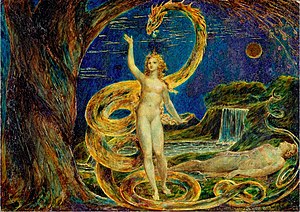
Back إغواء Arabic Pokušení Czech Versuchung German Tento EO Tentación Spanish Tentazio EU मोह HI Kísértés (fogalom) Hungarian Godaan ID Tentazione (cristianesimo) Italian
This article needs additional citations for verification. (March 2013) |



Temptation is a desire to engage in short-term urges for enjoyment that threatens long-term goals.[1] In the context of some religions, temptation is the inclination to sin. Temptation also describes the coaxing or inducing a person into committing such an act, by manipulation or otherwise of curiosity, desire or fear of loss something important to a person.
In the context of self-control and ego depletion, temptation is described as an immediate, pleasurable urge and/or impulse that disrupts an individual's ability to wait for the long-term goals, in which that individual hopes to attain.[1]
More informally, temptation may be used to mean "the state of being attracted and enticed" without anything to do with moral, ethical, or ideological valuation; for example, one may say that a piece of food looks "tempting" even though eating it would result in no negative consequences.
Research suggests that there are paradoxical effects associated with temptation.[1] Implicit in all the forms in which temptation can present itself there is a set of options that may facilitate high moral standards in decision-making.
- Weak or subtle temptations, in comparison to strong or obvious temptations, can lead to a greater loss of self-control.
- supported research states that "available temptations are less valuable and less tempting".[1]
Temptations can have effects on long-term goal attainment, it has been found that individuals who experienced temptation and the effects of it found there were benefits to their experiences.[1]